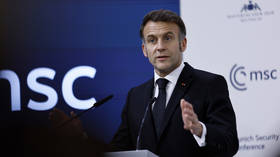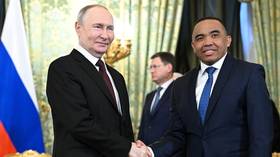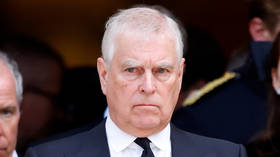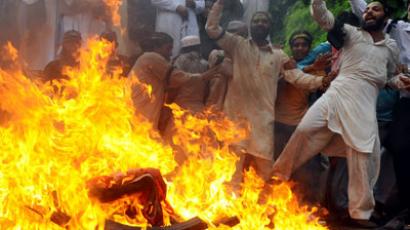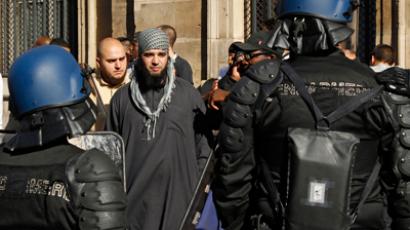When Prophet goes viral: ‘Freedom of speech has price’
A French weekly publishes a satirical cartoon of the Prophet Mohammed - fearing a backlash over the stunt, France is to close several of its embassies in the Middle East. RT asks political pundit Pierre Guerlain why freedom of speech trumps security.
Charlie Hebdo, a French satirical magazine, boasts its highest circulation this year – actually since the previous controversial issue guest-edited by “the Prophet Mohammed.” In November 2011, the weekly’s headquarters was firebombed by insulted Muslim protesters over the publication.This time, the consequences may be just as dramatic, given a week of violent protests around the globe over an amateur film mocking at the Prophet. Charlie Hebdo’s website has already been hacked, with the attack still ongoing.For France, the publication has brought an additional headache. French embassies and schools in around 20 countries will be closed over security concerns; some will not resume work till Saturday or later. In Lebanon, the country’s authorities have sent tanks to protect the French mission in Beirut.
At home, the French government refused to allow a planned protest on Saturday against the US-produced film The Innocence of Muslims to go ahead. Reports suggest that rallies against the cartoons prompted by several Islamic groups will not get a green light either.Earlier protests over The Innocence of Muslims saw some 150 people arrested in Paris over the weekend. That rally had not been sanctioned.To talk more about the controversy around the publication and protests, RT sits down with Pierre Guerlain, a professor of political science at Paris West University Nanterre La Defense.RT: This publication comes after a week of deadly protests all across the world, sparked by an anti-Islam film. How responsible is it to try and gain publicity this way?Pierre Guerlain: You have two issues here. One is freedom of expression and the other one is responsibility. By choosing to publish these caricatures right now they are adding fuel to the fire and personally I think it is not very reasonable, it is not responsible. You can defend freedom of expression, but you also have to be aware of what you are doing when you publish something. In the same way, as the movie that was made in the US was not very subtle and its intention was incendiary. Clearly here the context is very detrimental to this sort of publication.RT: France is shutting down its embassies and schools abroad, fearing a backlash over this satire. Is it worth putting people in danger for the sake of the freedom of speech?PG: It is not just the caricatures or the film that is causing all these attacks and trouble. You have, on the one hand, a political context, but on the other hand, you also have freedom of expression as a value in the West. This is something that should be defended.Within a specific context, publishing caricatures or a movie can be a very bad move. So here you have a clash between these two imperatives.This being said, French law is problematic as far as the freedom of expression is concerned.
RT: Satire mocking Islam is accepted in the press, but a gathering to protest the notorious anti-Islam film will not be given police permission. Is that going to escalate the situation even more?PG: It is probably going the situation for only a very small number of people. The majority of Muslims in France do not agree with violent attacks.The whole situation is creating a kind of confusion between a huge majority of Muslims who are non-violent and do not want to attack anyone and a few groups of people who are violent or want to demonstrate in a violent way. This creates confusion with the situation of the extreme right and some fundamentalist groups within the Muslim community which are very, very small in numbers and are a minority within this Muslim community.RT: Just yesterday, another provocative publication was banned in the French media – that of Britain's Kate Middleton's topless photos. Why is not freedom of speech in effect here?PG: What the law says is [that] when people are targeted as individuals, freedom of speech does not apply to slander. The problem within the French law is that some categories of speech are protected in the name of the historical truth while others are not protected. So there is a kind of ambiguity which does not, for example, exist in the American law.You also pay price for freedom of expression.Freedom of expression and what happens in foreign policy are two different phenomena. Freedom of expression can be in one way for people who deliberately want to target communities, to attack them. And it has a negative impact. As a value, it is not bad within a frame of a given society. The answer to whatever I said is more [freedom of] speech in a democratic society. And this is what the US does within its borders. Now what it does outside its borders in terms of its relations with the Muslim world is something totally different.Unfortunately, you have this clash of imperatives there and some people are hiding behind the value of freedom of speech in order to create conflict between communities.



